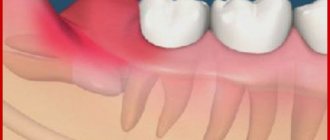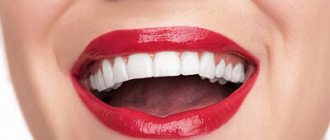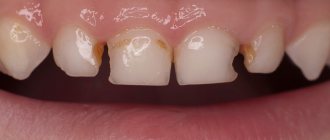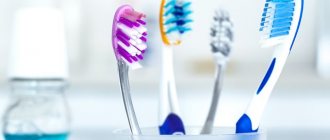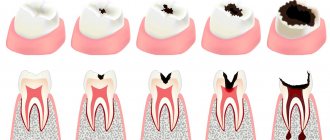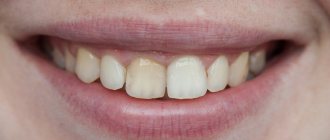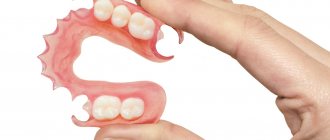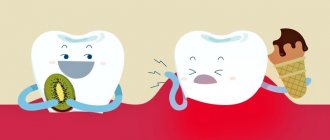Author of the article:
Soldatova Lyudmila Nikolaevna
Candidate of Medical Sciences, Professor of the Department of Clinical Dentistry of the St. Petersburg Medical and Social Institute, Chief Physician of the Alfa-Dent Dental Clinic, St. Petersburg
Dentists are often approached with such a problem as pain in the front teeth. There is nothing surprising. After all, although all our teeth have more or less the same internal structure, it is the incisors, due to their location, that are often subject to mechanical injuries.
In addition, our front teeth are distinguished by a thin layer of dentin (the bone tissue that makes up the bulk of the tooth). Because of this, caries on the incisors develops much faster than on other teeth.
Why do my front teeth hurt?
Front teeth can hurt for many reasons. Among them:
- Dental diseases, such as caries.
- Injuries to teeth and gums.
- Increased sensitivity of teeth.
- Incorrect treatment.
- Enamel wear.
- Inflammation of the facial nerve, which quite often occurs under stress.
- Inflammation of the gums, such as periodontitis.
In any case, only a qualified dentist can determine the cause of gum pain, so it is very important to see a doctor if you experience the slightest pain.
And in this article we will look in detail at the causes of pain.
Caries on front teeth
Carious formations do not appear overnight; it is always a gradual process due to the fact that pathogenic bacteria multiply in dental plaque and weaken the enamel. The destruction of the enamel gives microbes a “pass” into the tooth, where the pathological process grows, affecting healthy tissue.
Pain in the front teeth occurs at a late stage of caries, when the pulp is affected, including the nerve process that is part of it. That is, this symptom is no longer a reason to go to the dentist, but a persistent warning - it will only get worse.
It should be noted that carious formations are largely associated with insufficient oral hygiene. Other, less important factors include:
- lack of minerals in the diet;
- lack of solid food;
- heredity;
- systemic diseases that disrupt metabolism;
- dental injuries and others.
It is very important to brush your teeth correctly using suitable products. ASEPTA offers the best toothpastes for the whole family. They gently cleanse, saturating the enamel with minerals. A series of products for adults is designed specifically taking into account the needs of people. Thus, “ASEPTA PLUS” COFFEE AND TOBACCO eliminates the consequences of drinking strongly colored drinks and smoking cigarettes, and also whitens the enamel.
Trauma to a tooth or gum
If the enamel of a front tooth or gum is injured, pain may be felt. Upon examination, you may see cracks in the enamel, darkening or redness, and slight swelling of the soft tissue.
Tooth injuries are dangerous due to the development of caries, since cracks allow pathogenic bacteria to enter. You should definitely contact your dentist if you feel pain in your front teeth.
Increased tooth sensitivity
An intense tooth reaction to cold/hot or sweet foods is a sign of thinning enamel. The reasons for this can be different - from a lack of minerals in the body to metabolic diseases.
Increased sensitivity of enamel is a reason to schedule a visit to the doctor. He will determine the cause of this symptom and prescribe adequate treatment.
To reduce painful manifestations, use ASEPTA SENSITIVE paste, which will saturate the enamel with the missing mineral components.
Consequences of dental treatment
If you have recently had dental treatment and your tooth still hurts, you should think about the possible causes. So, on the first day after the intervention, pain in the front teeth is normal. It can be felt as an unpleasant weak sensation (you “feel the tooth”) or as a low-intensity aching pain. However, if it is excessive and difficult to bear, consult your doctor.
If painful symptoms continue for 3-4 days and the pain does not subside, this is a reason to visit the dentist again. Perhaps the treatment was carried out incorrectly or complications occurred.
Enamel wear
This phenomenon is uncommon, usually accompanies systematic violations of hygiene rules, some chronic diseases, or is associated with heredity. If you feel that your front teeth - lower or upper - are hurting, but you don’t notice any defects on them, this is also a reason to consult a dentist. If the discomfort is associated with abrasion of the enamel, the doctor will prescribe remineralizing procedures and also help adjust the diet. Thus, if there is a lack of minerals, it is recommended to use special vitamin and mineral complexes, for example, ASEPTA.
Inflammation of the facial nerve
Hypothermia, stress, decreased immunity due to illness - all this can lead to an inflammatory process in the facial nerve, which can be felt as pain in the front teeth and jaw. The feeling is very unpleasant. The pain is quite strong, acute, dulled only by a strong analgesic.
Be sure to consult a therapist with this problem. Try not to get too cold, drink more fluids, as it helps remove waste products.
Gum diseases
Problems with the gums can manifest themselves as pain in the front teeth; treatment in this case is aimed specifically at solving problems with soft tissues. The reasons for them are varied - from injury to non-compliance with hygiene standards. Only a doctor will determine what factors provoked the disease.
A visual examination of the gums may show tenderness, redness, and swelling. This is a reason to visit a doctor in the next 1-2 days.
Possible complications
Since bruising of a gum, tooth or other tissues in the oral cavity is always individual, it is impossible to give reliable predictions about recovery and possible complications. It usually takes several visits to the dentist to carry out the necessary examinations and procedures, after which a complete recovery can be established. If you do not approach the treatment process responsibly, you can get the following complications:
- darkening of the enamel (due to the penetration of pollutants through cracks, blood entering the pulp and disruption of the nutrition of dental tissues);
- death of pulp cells and formation of necrotic areas leading to tooth death;
- chronic inflammatory processes (pulpitis and periodontitis) leading to more serious consequences.
Very often, a tooth bruise leads to serious but hidden injuries. The victim may feel minor pain and think that everything will go away soon. However, this is not a reason to avoid qualified medical care. The sooner an examination is carried out in a dental office, the greater the likelihood that all consequences will be eliminated, complications will be avoided and the tooth will be as healthy as possible.
What can cause pain on the front teeth?
First of all, the fact that the front lower or upper teeth hurt, of course, is due to incorrect or insufficient oral hygiene. You can also identify such provoking factors as:
- constant mechanical impact, for example, due to a love of nuts or seeds;
- non-compliance with the dentist’s recommendations after treatment;
- bruxism (grinding teeth in sleep);
- untreated teeth in the mouth;
- hereditary predisposition;
- poor nutrition;
- occupational hazards (boxers, trumpet players, etc.);
- using forks, toothpicks, needles to clean interdental spaces;
- malocclusion.
It is important not to forget that the gap between the front teeth is often so narrow that it is impossible to get any leftover food out of it. This is why flossing your front teeth is important. It is also very important to visit the dentist on time, since carious stains are often located on the inner surface of the tooth, and only a doctor can see them.
If your front teeth hurt, most likely this means that pulpitis has begun to develop due to advanced caries.
First, the tooth begins to respond acutely to temperature fluctuations (hot drinks, cold weather, etc.), then it begins to bother you when biting food. At a later stage, sharp pain in the front teeth can occur at any time, even during sleep.
In this case, you need to contact your dentist, and the sooner the better. Only he can cure this disease and restore health and beauty to your smile.
Additional symptoms
In dentistry, a condition in which teeth ache or ache is called hyperesthesia. In this case, there is an increase in the sensitivity of the enamel due to the action of various predisposing factors.
Additional signs of hyperesthesia:
- the appearance of characteristic pain after eating sweet, sour, cold or hot foods and drinks;
- teeth begin to ache when inhaling cold air;
- pain can spread to several teeth and the entire jaw, increases when trying to knock on the teeth;
- during a painful attack, salivation increases, it becomes difficult to talk, especially on the street, as the teeth suddenly begin to ache;
- Due to constant pain, appetite decreases; people are forced to eat only semi-liquid food, since chewing causes discomfort.
When teeth begin to ache, a person takes a forced position, tries to place warm palms on his face and have as little contact with irritating factors as possible. It is impossible to endure such pain for a long time. And in order to understand why teeth hurt and what can be done about it at home, it is necessary to understand what irritants cause hyperesthesia.
Treatment of anterior teeth
Many people are interested in whether the front teeth are treated. Of course they do. True, the accuracy, precision, experience and qualifications of the doctor are important in this case, because the front teeth are very thin and can be easily damaged.
An experienced doctor will do everything possible to keep the tooth intact and at the same time remove carious lesions. Quite often, the front teeth suffer from pulpitis.
How are anterior teeth with pulpitis treated? To do this, the doctor uses local anesthesia, and after the medicine takes effect, the dentist removes the affected nerve, then carefully cleans the canals and seals them. And only after that he directly begins to restore the tooth.
And to make sure that the treatment was carried out correctly, the doctor may additionally order an image to be taken after the filling.
If you feel that your front tooth hurts after treatment, immediately visit the dentist and tell us about this problem.
For your part, try to prevent the occurrence of caries and pulpitis. Maintain diligent oral hygiene, in addition to regularly brushing your teeth morning and evening, using dental floss and disinfectant rinses. We recommend using products from the ASEPTA line, which are developed and produced by the pharmaceutical industry.
It is also necessary to monitor your diet, eating fresh fruits and vegetables, fish, dairy products and limiting sweets and starchy foods.
Clinical researches
During clinical trials using a series of Asepta products, conducted in the department of periodontology of the Central Research Institute of Dentistry and Maxillofacial Surgery of Rosmedtekhnologii, Moscow, the high effectiveness of Asepta products for moderate periodontitis was proven. The use of Asepta mouth rinse turned out to be quite effective. In addition, no phenomena of mucosal irritation or brown staining of fillings were recorded. This indicates that the use of this rinse for a two-week period provides an obvious clinical effect in the absence of negative side effects.
Sources:
- Report on determining/confirming the preventive properties of commercially produced personal oral hygiene products: Asepta toothpaste used in combination with Asepta mouthwash and Asepta gum balm Head. Department of PFS Doctor of Medical Sciences Professor S.B. Ulitovsky St. Petersburg State Medical University named after Academician I.P. Pavlova. Faculty of Dentistry. Department of Preventive Dentistry.
- Clinical experience in using the Asepta series of products Fuchs Elena Ivanovna Assistant of the Department of Therapeutic and Pediatric Dentistry State Budgetary Educational Institution of Higher Professional Education Ryazan State Medical University named after Academician I.P. Pavlova of the Ministry of Health and Social Development of the Russian Federation (GBOU VPO RyazSMU Ministry of Health and Social Development of Russia)
- Clinical and laboratory assessment of the influence of domestic therapeutic and prophylactic toothpaste based on plant extracts on the condition of the oral cavity in patients with simple marginal gingivitis. Doctor of Medical Sciences, Professor Elovikova T.M.1, Candidate of Chemical Sciences, Associate Professor Ermishina E.Yu. 2, Doctor of Technical Sciences Associate Professor Belokonova N.A. 2 Department of Therapeutic Dentistry USMU1, Department of General Chemistry USMU2
